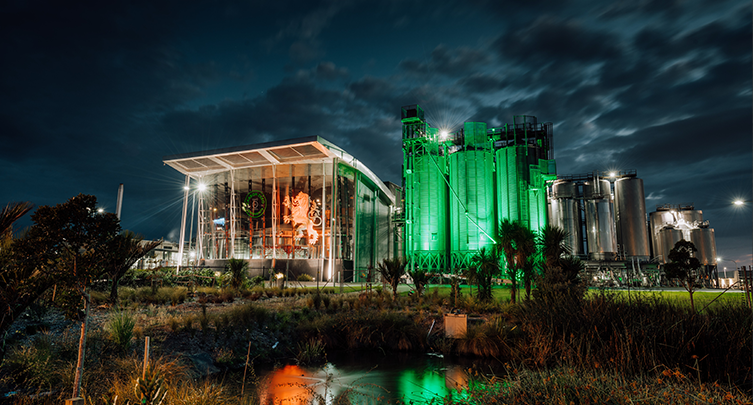To mark Earth Day 2021, New Belgium – part of Lion Little World Beverages – produced what will probably be remembered as their worst beer in over thirty years of brewing. Dubbed ‘Torched Earth’, the brew utilised an apocalyptic range of ingredients in which drought-resistant grains such as millet and buckwheat substituted for barley, dandelion replaced cool-climate hops, and even the water was treated to simulate smoke taint.
Over the next century this might not seem such a hypothetical exercise, as climate change increases the frequency and severity of crop failure and wildfires and makes the premium ingredients that underpin industries like ours more and more scarce.
However, as the sixth assessment report from the Intergovernmental Panel on Climate Change makes clear, there are far more dire consequences awaiting the planet than underwhelming beer if concerted and imminent action is not taken to reduce emissions and transition to a clean energy future.
World leaders will meet again in Glasgow at the end of October to reevaluate the global policy response, and I’m hopeful that they will rise to the moment. But for some time it has been clear to me that we can’t wait for perfect policy or leave all of the hard decisions to governments.
Business must lead.
Specific expectations around climate from our employees, customers and shareholders are building with each changing season, even through this pandemic. Above this sits a more universal responsibility for corporate leaders to ensure that our planet remains a place conducive to business and supportive of our quality of life for future generations.
Lion’s story – ramping up action on climate
For Lion, 2020 represented a step-change for our climate commitments.
After a comprehensive assessment of our carbon footprint, we set a direct carbon reduction target of 30% of our 2015 baseline by 2023. This immediate and meaningful goal laid the foundation for a suite of practical initiatives to reduce emissions, including the production of biogas from brewery wastewater, the installation of rooftop solar at the XXXX and Little Creatures breweries, and investment in new energy-efficient machinery, including cogeneration plants.
We have also pursued the adoption of a number of renewable electricity power purchase agreements (PPAs). This included a partnership with the NSW AHA on the world’s first industry-scale PPA, securing cost-effective renewable energy from solar and wind farms for the Tooheys brewery at Lidcombe as well as over 230 pubs and clubs across the state.
The results are testament to what can be attained even over a short timespan by a determined business. We’ve already achieved a 28% reduction in our carbon footprint from a 2015 baseline. The 100% renewable PPA in NSW slashed emissions by over 15,000 tonnes, while rooftop solar at XXXX alone reduced emissions there by 1,400 tonnes. Our efforts culminated in certification as Australia’s first large-scale carbon-neutral brewer, an accomplishment of which I am extremely proud.
Taking our climate credentials to the marketplace
Our brands are setting the standard for large brewers on climate, and we’re determined to take customers and consumers on the journey with us. Although, in reality, Australians aren’t in need of convincing. A recently published study from a group of Victorian academics found that climate change was three times more likely to be ranked highly as a problem than COVID-19, despite the survey taking place during the second wave of coronavirus outbreaks and lockdowns in 2020. There’s less of a need to sell customers on the merits of climate action than to identify the shared value in what we’re doing.
To this end, we’ve identified clearly on our Australian packaging that our product has been ‘brewed and bottled around Australia in carbon neutral breweries’. In New Zealand we’ve achieved carbon-zero certification for Steinlager – ten percent of the country’s beer market – and we’re proudly advertising this fact. New Belgium has been at the forefront of sustainability in American brewing for many years, and their Fat Tire Amber Ale this year became the first nationally-distributed carbon neutral beer in the US. To raise awareness of the fact and drive others to action in the industry, the team partnered with retailers to increase the price of Fat Tire six-packs ten-fold to $100, highlighting the potential effect of climate change on consumer affordability.
Setting up processes and partnerships to drive change
While always happy to raise the salience of these issues in the marketplace, we owe our progress on emissions reduction to the way in which our senior leadership, supported by our people and partners in the supply chain, have approached this as a serious business challenge rather than a PR exercise. Our Carbon Zero working group is a cross-functional team from across the business, guided by our in-house environmental experts, that has drawn on robust, credible data to outline the challenge, set steps to mitigate our impact and clearly identify the benefits of action to the business.
We’ve been fortunate to have the support of a number of partners in our efforts, some specifically engaged to advise on climate strategy but many others in our supply chain who share a common vision on these issues.
These will be ever more important as we build on our success in reducing emissions, up and down our supply chain. In July we announced a commitment to a net zero value chain by 2050, a move which requires us to work with suppliers and customers to tackle our collective lifecycle emissions. The commitment we have already made to acknowledge and deal with carbon emissions in our own facilities serves as table stakes in these discussions, giving us credibility to explore partnership opportunities to drive change along with our supply chain partners.
Fortunately, at this point in time there is no shortfall in collective willingness around our industry to tackle the issue of climate change, and the prospects for partnerships that will deliver substantial and lasting change are strong. The business imperatives are clearly recognised, but the bottom line is that none of us want to live on an overheated planet drinking smoky, dandelion beer.


